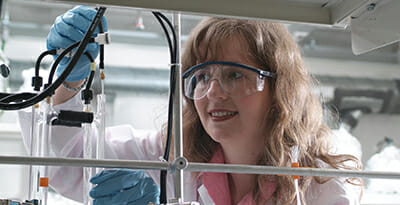Monday, February 8, 2021 11:00 AM - 11:45 AM MST
Microbiota Transfer Therapy for Autism: Multi-Omic Approaches and Lessons Learned

During every instant of life, over a hundred trillion microbes, collectively known as the microbiome, reside on skin surfaces and course through the human body. In the human gut, vast colonies of bacteria, belonging to around 1000 different species, carry out duties ranging from the digestion of food and the management of body weight to effects on the brain and behavior, many of these still elusive to science.
Recent studies in mice and humans have revealed intriguing links between the composition of gut microbiota and Autism Spectrum Disorder (ASD), a disease believed to affect one in 54 children, according to the Centers for Disease Control. Dr. Krajmalnik-Brown’s lecture will propose linkages between gut bacteria and ASD, highlighting encouraging results of a microbiome-targeted, ASD open-label clinical trial.
The approach described involves the transfer of healthy gut microbes into the gut of ASD patients over a period of 7-8 weeks, as a means of treating symptoms of the disorder. Known as microbial transfer therapy (MTT), the technique seeks to address the gastrointestinal issues commonly associated with ASD as well as offer relief from some of the characteristic behavioral manifestations of the disease.
ASD is a complex neurobiological disorder, whose roots are still unknown. The affliction often takes hold in early childhood, impairing social interactions and communication, leading to restricted, repetitive, and stereotyped patterns of behavior. Gut microbiota are known to play a role in ASD, which produces problems in the GI tract that are often correlated with ASD severity. Researchers have found an abnormal composition of gut bacteria in ASD patients who lack the broad microbial diversity associated with a healthy gut microbiome.
Krajmalnik-Brown, director of the Biodesign Center for Health Through Microbiomes at ASU, along with her colleagues, have extended earlier studies, administering MTT to 18 ASD-diagnosed children and carefully monitoring their GI and behavioral responses. The treatment began with a 2-week antibiotic regimen and bowel cleanse, a stomach acid suppressant, followed by an extended transplant of gut microbes from healthy individuals, using a high initial dose followed by daily and lower maintenance doses over a period of two months.
Initial results showed marked expansion in the diversity of gut microbia, an 80% reduction in GI symptoms and improvement in autism-related behavior. A review of the original 18 participants two years after MTT treatment showed further encouraging results. Most of the GI improvement following treatment was maintained while behavioral correlates of ASD further improved over time. Bacterial composition was significantly enhanced by the treatment, seen in particular in the in bacterial diversity and relative abundances of two species, Bifidobacteria and Prevotella, along with other taxa.
Following MTT, levels of many metabolites in plasma were shown to more closely resemble those in normally developing children, presumably as a result of adjusting ASD microbial colonies to more closely approximate the normal, healthy gut.
The research has benefitted from a multi-omic approach, which examines microbes, pathways, genes, and metabolites—potential candidates for more accurate biomarkers and targets for future treatment. “Through blood metabolomics we were able to see that the microbiome changes lead to systemic changes for meaningful metabolites. This is exciting and promising,” Krajmalnik-Brown said.
The study findings suggest the long-term safety of the MTT method and provide a hopeful avenue of further research in the diagnosis and management of this widespread illness, for which there is still no established medical treatment.